Hubert Sosnowski: Inspiracją dla tego wywiadu była Twoja wypowiedź: „Zawsze miałem nadzieję, że zanim odjadę w stronę zachodzącego słońca, stworzę jeszcze jednego Fallouta”. Ile Fallout dla Ciebie znaczy? Czym Fallout jako gra (lub idea) jest dla Feargusa Urquharta?
Feargus Urquhart: Muszę cofnąć się wiele, wiele lat wstecz. Kiedy miałem dziesięć lub jedenaście lat, poznałem
Dungeons & Dragons. Dla dzieciaka, który był trochę nerdem – albo wielkim nerdem [uśmiech] – to był impuls do czytania fantastyki. Tolkien, seria
Spellsinger Alana Deana Fostera,
Belgariada Davida Eddingsa. Bardzo podobały mi się te przygody w innym, wyobrażonym świecie. To utrzymało się do liceum, kiedy to zapisałem się do klubu gier i nagle znalazłem się w większej grupie. Wcześniej w
DnD graliśmy w trzy, cztery osoby. Nowy etap zrodził we mnie miłość do tego typu gier, do opowiadania historii, przedstawiania postaci i robienia tego, co ci się żywnie podoba. Uwielbiam gry planszowe, zawsze mieliśmy jakieś w domu. Ale gry fabularne są inne i dają możliwość bycia tym, kim jesteś, lub kimś zupełnie innym w jakimś odjechanym świecie. Minęło kolejne kilka lat – poszedłem na studia i dostałem pracę w branży gier. W 1996 roku otrzymałem możliwość pracy nad RPG. Pierwszym z nich było po prostu
Dungeons & Dragons dla Interplaya. Prowadziłem dział, a
Fallout pierwotnie nie był jego częścią. Ale!
Przyjaźniłem się z Timem Cainem oraz Leonardem Boyarskym i rozmawialiśmy cały czas. Błędem jest stwierdzenie, że potrzebowali pomocy. Potrzebowali... wsparcia. Aby skoncentrować się na grze, potrzebowali większego wsparcia ze strony Interplaya; zasobów itp. W ten sposób
Fallout wszedł do działu RPG, z którego powstało Black Isle Studios. Dla mnie ważne jest to, że
Fallout był pierwszą grą, nad którą pracowałem, która uosabiała klimat
DnD; przygody, postacie, sprawczość. Cały czas używaliśmy słowa „sprawczość”, aby podkreślić, że można podejmować własne decyzje i być tą samą osobą co w prawdziwym świecie. Ten szalony świat
Fallouta ma sens. Nie jest prawdziwy, ale wydaje się być rzeczywistością, którą rozumiemy. Jeśli ktoś twierdzi, że chciałby się tam przenieść, to prawdopodobnie nie wie, co mówi. [śmiech]
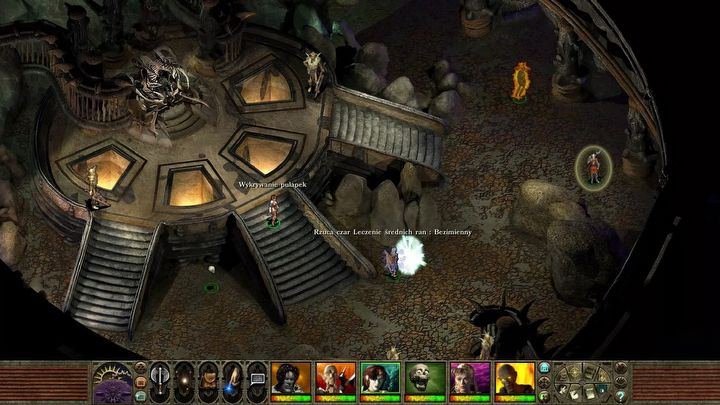
Planescape Torment, Interplay Entertainment, 1999
H.S.: Zapytaj preppersów.
F.U.: [uśmiech] To jak Disneyland. To nie jest prawdziwe życie, ale wszystko ma sens i pasuje do siebie, a ty możesz iść – i jak powiedziałem – być, kim jesteś, kim chcesz być. Właśnie to odbiło się echem i może to tylko moje wychowanie – jestem dzieciakiem z czasów zimnej wojny i z tego punktu widzenia bomby miały wiele sensu. Dużo grałem w
Monopoly z moją rodziną, więc Pip-Boy robiący to [Feargus pokazuje kciuk do góry] pochodzi stąd.
H.S.: Wiedziałem, że skądś znam tego gościa!
F.U.: Dokładnie! I przepraszam, że powiedziałem „Pip-Boy” – to oryginalne imię Vault Boya. Ale ogólnie wszystkie te rzeczy razem tworzyły esencję tego, czym
Fallout dla mnie jest. Moje wychowanie, wspólne granie w gry RPG i świat, w którym musisz przetrwać. Myślę, że jakaś jaszczurza część naszego mózgu lubi takie koncepcje. Tak naprawdę tam nie umieramy, bądźmy szczerzy, ale chcemy myśleć, że moglibyśmy być tą osobą w tym świecie. W kombinezonie Vault i ze scyzorykiem.
H.S.: OK, więc Fallout jest częściowo historią o Twoim pochodzeniu, a częściowo wyrazem wolności w odgrywaniu ról.
F.U.: Tak, dokładnie.
H.S.: Więc w zasadzie zacząłeś od Fallouta i chciałbyś, by był również Twoim ostatnim dziełem. Zatem jak wyglądałby ten ostatni Disneyland, Twój ostatni Fallout, wyraz wolności?
F.U.: Nie cierpię nudnych odpowiedzi, ale chodzi tylko o to, by przyciągnąć ludzi i umieścić ich z powrotem w tamtym świecie. Tyle.
Mogę mieć odmienny pogląd na tworzenie gier niż inni. Na przykład
Avatar 2 właśnie wyszedł po dziesięciu lub piętnastu latach pracy Jamesa Camerona. Wtedy rozmawialiśmy z nimi o stworzeniu gry
Avatar 2... Nawet nie wiem, jak dawno temu to było. Sześć, osiem lat, jakoś tak. Cameron produkuje arcydzieła, a dla mnie tworzenie gier to po prostu umieszczanie ludzi w różnych światach i zapewnianie im niesamowitych przygód. Nie mam takiej potrzeby, żeby każda gra, którą stworzyłem, była
Avatarem 2, no nie? Oczywiście to pragnienie projektowania rzeczy niesamowitych jest potrzebne. Nie da się zacząć od nastawienia w stylu „meh, po prostu coś wypuść, meh”; wcale nie o to chodzi. Ale mam też przeświadczenie, że zawsze postrzegałem swoją karierę jako opartą na wielu grach. Nie tylko na jednej.
Więc jeśli zrobimy kolejnego
Fallouta, dla mnie to będzie KOLJENY rozdział
Fallouta, a nie OSTATNI. I to jest dla mnie interesujące, bo takie poczucie jest wyzwalające – nie muszę tworzyć wiekopomnych gier, filmów czy książek. Taka deklaracja przed samym sobą czy opinią publiczną to pułapka. Mój jedyny cel w kolejnych grach – również jeśli mamy zrobić kolejnego
Fallouta – to odpowiedzieć na pytania: co nam się spodoba? Co naszym zdaniem będzie lepsze? Co podobałoby się ludziom? Co będzie lepsze według nich? Czego nauczyliśmy się przez ostatnie dwa, pięć, dziesięć lat? A potem wziąć się za tworzenie tego świata. Użyć komputera lub konsoli, aby wykreować niesamowicie wyglądający świat. A jednocześnie pamiętać, że ważniejsze są historie, postacie i rzeczy, które gracze mogą robić w tym świecie. I to właśnie jest
Fallout. Daje ludziom poczucie obcowania z prawdziwym światem i po prostu pozwala im się bawić.
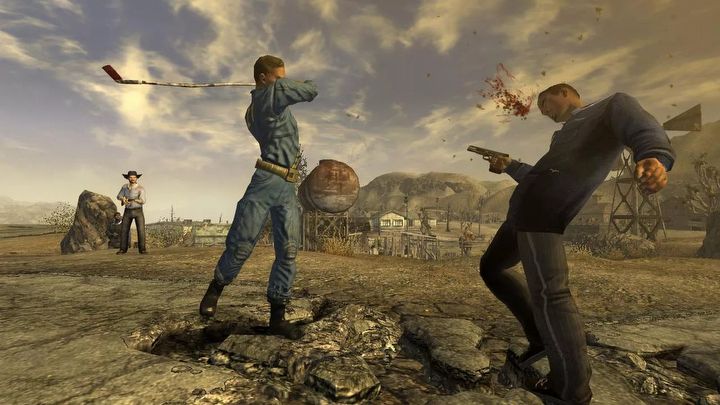
Fallout: New Vegas, Bethesda Softworks, 2010
H.S.: W zasadzie wpadłeś teraz w moje sidła, ponieważ chciałem zapytać, o czym mógłby być ten nieistniejący Fallout? Nie konkretnie, pod względem fabuły, ale tematyki, zasad projektowania, może rozmowy o współczesnych podziałach społecznych. Nie wiem, czy miałeś to samo wrażenie, ale kiedy w tym roku wróciłem do New Vegas i dotarłem do pierwszego spotkania z Legionem Cezara, zauważyłem pewne podobieństwo do niektórych grup ludzi – zarówno w moim, jak i Twoim kraju – zagubionych z podobnych powodów. Podziały są te same, ale ich źródło jest inne. Więc grając w tego Fallouta, czułem cudowny paradoks bycia w innym świecie, który jednak pozostaje w jakimś sprzężeniu z tym prawdziwym. Wyłapałem też bezwzględny komentarz społeczny w The Outer Worlds. Czy są więc jakieś problemy, które niepokoją Ciebie i Twoją załogę – kwestie, które można by poruszyć w następnym Falloucie? Masz jakieś pomysły, które chciałbyś zrealizować? Jakieś nadzieje lub ostrzeżenia?
F.U.: [śmiech] No więc odpowiedzi na takie pytania zawsze najlepiej zacząć od bardzo wyraźnego zastrzeżenia: nie pracujemy nad
Falloutem i nawet nie rozmawialiśmy o tym, czym mógłby być.
H.S.: Oczywiście. Mówimy o całkowicie hipotetycznej grze.
F.U.: Tak, ale mogę mówić o tym, jak osobiście patrzę na
Fallouta. Jedna rzecz, o której czasami myślę w kontekście przeszłości, to to, jak wiele pytań dotyczących
Fallouta 3 otrzymywałem. Wielu dziennikarzy próbowało złapać mnie w pułapkę; chcieli, żebym powiedział coś w stylu: „Och,
Fallout 3 nie jest prawdziwym
Falloutem, nie jest jak
Fallout czy
Fallout 2, nie jest turowy”. A wspominam o tym z uwagi na to, czego dokonał
Fallout 3. Za każdym razem, gdy grasz w
Fallouta, chodzi o ten świat.
I masz rację. Wierzę, że nasze
Fallouty są zwierciadłem naszej rzeczywistości. Lub – jak wspomniałeś –
The Outer Worlds, choć było to dzieło Tima Caina i Leonarda Boyarsky’ego, którzy oczywiście tworzyli też
Fallouta 1 i zapoczątkowali produkcję
Fallouta 2.
Może wynika to ze sposobu, w jaki robimy gry fabularne, ale oczywiście mamy też ogólne motywy, historie. Jednak potem przekazujemy fragmenty gry grupom ludzi, „kapsułom” i „zespołom szturmowym”, które mają swobodę w dalszym rozwijaniu tych elementów produkcji. Myślę, że ta wolność jest dużo większa niż w wielu innych studiach. Kieruje mną wyraźne przeświadczenie, że nie jestem genialny. Jestem stosunkowo kreatywny, ale niesamowitą kreatywność można uzyskać, dając ludziom pewne wytyczne, a następnie po prostu pozwalając im pracować. Myślę, że to generuje pewną konwersację twórców z otaczającym ich światem, tym, co dzieje się z nimi i z rzeczywistością wokół nich.
Myślę, że po części dziwna odpowiedź na twoje pytanie brzmi: nie wiem. Nie mam pewności, jakie są cele poszczególnych motywów, ponieważ są to historie, które indywidualne zespoły będą opowiadać o regionach, jakie same tworzą. Jest kilka rzeczy ogólnych, masz oczywiście rację. Kiedy Josh przygotowywał koncepcję
Fallouta New Vegas, wpadał na takie pomysły. Wiedział, co to jest RNK, kto to są Kajdaniarze, kim są ludzie z Goodsprings, kto należy do Legionu Cezara, kim jest sam Cezar. To są takie motywy przewodnie. To trochę tak jak ze specyficzną kolorystyką, którą wiele zespołów stosuje w każdej części gry, jaką tworzy, ale potem opowiada własne historie za pomocą postaci. Więc to szaleństwo jest zrozumiałe – nie jak szaleństwo Legionu Cezara – to tutaj ma sens...!
H.S.: W bardzo specyficzny sposób...!
F.U.: [śmiech] Dokładnie, w bardzo specyficzny sposób. Co do drugiej części odpowiedzi. Nieważne, czy mowa o
Falloucie, czy o innej grze, którą tworzę – przychodzi mi do głowy kilka interesujących tematów. Jednym z nich jest odpowiedzialność. Chcę tworzyć historię RPG o osobistej odpowiedzialności. Myślę, że to bardzo ważna rozmowa do odbycia. O ludziach odpowiedzialnych. Podobają mi się też pomysły, które pojawiły się w
The Outer Worlds i które doprowadzono do bardzo zwariowanego ekstremum. Wiesz, o korporacjach itd., ale na razie nie mam pojęcia, czy to jest coś, co by się wydarzyło u mnie. Ala nadal – kwestia sposobu na obdarzenie gracza większym poczuciem odpowiedzialności jest czymś bardzo interesującym do zgłębienia.
H.S.: Odpowiedzialności za co? Za osobiste działania? Świat wokół ciebie?
F.U.: Myślę o tych dwóch rzeczach. Ty ponosisz odpowiedzialność. Jesteś odpowiedzialny za czyny, które mają konsekwencje. To może być interesujący moment na stworzenie takiej gry RPG. Najlepszą robotę wykonujemy, kiedy doskonale wiemy, co gracz zrobi w naszej grze, a następnie pokazujemy reakcje na te działania. To mogą być rzeczy subtelne; nie mogą to być rzeczy niesubtelne. Chodzi mi o to, że najlepsze, co możemy zrobić, to pokazać graczom efekty ich działań – co się stało, a co nie, na skutek ich czynów. W ten sposób wzmacniasz poczucie odpowiedzialności za te działania.
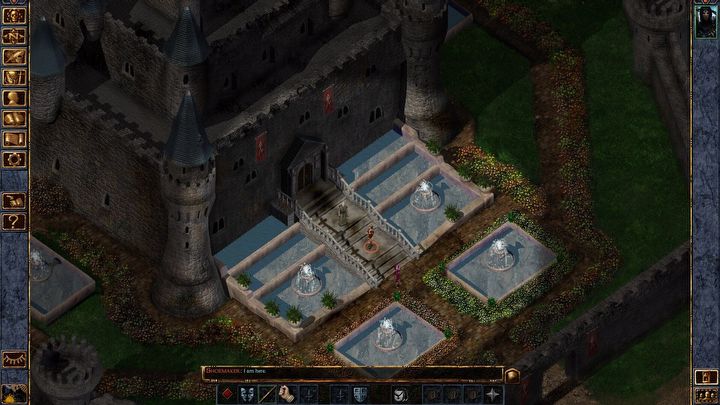
Baldur's Gate, Interplay Entertainment, 1998
H.S.: Czy jest jakiś konkretny aspekt tej odpowiedzialności lub coś, czego się boisz? Wybacz, nie odpuszczę tak łatwo! Gdybyś był częścią lub liderem jednego z tych zespołów Fallouta – co chciałbyś opowiedzieć za pomocą gry? Jedna historia, jeden dylemat.
F.U.: [śmiech] Wiem, wiem. Czasami, gdy próbujesz skonfigurować system w grze, zastanawiasz się, co gracz próbuje zrobić, co wymyśli, jak to zrobić i jak sprawić, by gra na to zareagowała. To może skutkować czymś, co można nazwać osobistymi zasadami.
Podam przykład czegoś, co faktycznie umieściłem w
Falloucie 1. Ilustruje to konieczność odpowiedzi na działania graczy. W The Hub jest sklep, w którym czeka mnóstwo naprawdę dobrego sprzętu.
Fallout 1 działa tak, że możesz po prostu podejść do stołu i wziąć przedmioty, które w przeciwnym razie mógłbyś kupić. To coś, na czym naprawdę zależało Timowi [Cainowi – dop. red.]. Tester odkrył – ponieważ zrobiliśmy niewystarczająco wiele w zakresie ochrony przedmiotów – że da się zwyczajnie łazić po poziomie 5 i kraść wyposażenie, do którego dostęp normalnie zyskujesz na poziomie 15. Naturalnie to znacznie ułatwiało grę.
Pomyśleliśmy: „OK, to jest problem”. Więc zaproponowałem: „Postawmy tam strażników”. Byli na naprawdę wysokim poziomie, ale...! Chcieliśmy również, aby ludzie poczuli, że i tak istnieje szansa na zdobycie tych rzeczy. Umieściliśmy więc strażników w bardzo określonych miejscach, aby gracze mieli szansę spróbować. Wprowadziliśmy bardzo niewielką szansę na zdobycie kilku fantów i wyjście z tego cało. Zrobiliśmy to, sprawiliśmy, że na pewnym poziomie jesteś potężniejszy niż strażnicy. Możesz przyjść, zabić ich i zabrać towar – jeśli chcesz być tego rodzaju postacią. Wspominam o tym, bo to odpowiada na pytanie o odpowiedzialność. Chcę ustalać zasady, które gracze rozumieją. W efekcie tego gracze sami mogą zdecydować, czy chcą ukraść wszystkie rzeczy, czy też nie kraść ich później. W ten sposób mogą być tym, kim chcą. Co więcej, ustaliliśmy, że gra powinna wzmacniać przekonanie, że jeśli spróbują coś zrobić, może to mieć dla nich złe skutki. To nie jest tak, że gracz dostaje kulkę za każdym razem, gdy łamie zasady społeczne w grze.
To przykład szerszego spojrzenia na którąkolwiek z naszych gier i zadania pytania: jakie są wszystkie sposoby, w jakie ludzie będą się zachowywać w tej grze? A potem staramy się na to reagować. Cokolwiek motyw osobistej odpowiedzialności mógłby – a może nie – osiągnąć, cała gra musi to po prostu wzmocnić. Przez to, jak NPC rozmawia z tobą na podstawie twoich czynów lub ich braku. Podobnie jak kwestia kradzieży, wtrącanie graczy do więzienia. Sprawianie, by ludzie czuli się dobrze, będąc dobrymi, lub sprawianie, by czuli się dobrze, będąc złymi.
To jest coś, co jest naprawdę ważne w grach i coś, co wzmacnia osobistą odpowiedzialność – i muszę przyznać sto procent zasługi za to Chrisowi Avellone’owi. We wczesnych latach Obsidian kontynuował ten kierunek. W przeszłości, gdy gracze byli źli, stawialiśmy ich w negatywnym świetle, ale chodzi o to, aby zachęcić graczy do bycia tym, kim są. Istnieje zakres, w którym jest to możliwe. Jeśli chcemy umożliwić graczom bycie złymi postaciami lub kimś, kto zyskuje coś siłą, jeśli pozwalamy na taki styl gry, to musimy reagować na to pozytywnie. Nie tak, jak myśleliśmy na początku naszej kariery.
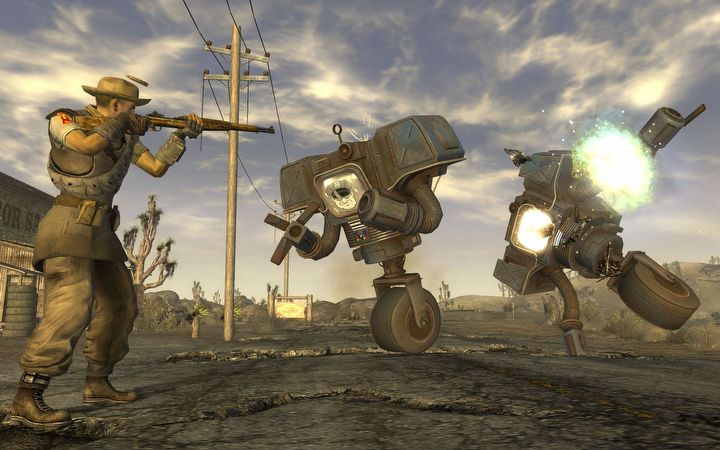
Fallout: New Vegas, Bethesda Softworks, 2010
H.S.: Czy jest jakiś współczesny problem, który chciałbyś poruszyć, uczynić częścią gry?
F.U.: Rzeczą, o której myślę najmocniej, jest chyba środowisko. Myślę o tym, co się dzieje, nie wiem, jak odzwierciedlić to w grze, ponieważ nie chcę okładać graczy tym tematem po głowie. Nie tędy droga. Nie wiem, czy to kiedykolwiek będzie tematem. Jeśli chcielibyśmy zawrzeć coś takiego, musielibyśmy wymyślić, jak przedstawić to w grze w interesujący sposób. To jest nasza praca. Aby zapewnić tobie i wszystkim innym gry sprawiające przyjemność. W branży są gry, które mają określone cele, i myślę, że ludzie to rozumieją i nie przeszkadza im to, ale w większych RPG, które tworzymy, chodzi o to, by ludzie wchodzili w nie i dobrze się tam bawili. Chodzi o poczucie sukcesu, poczucie ucieczki.
Niezależnie od tematu, który chcemy poruszyć, musi być on drugorzędny w stosunku do przyjemności graczy. Możemy być subtelni, robić to w ciekawy sposób, ale zawsze wiemy, na czym polega nasza praca. Nie chodzi o to, żeby pokazać i powiedzieć: „Patrzcie, jacy jesteśmy niesamowici – kochajcie naszą grę, bo to my ją stworzyliśmy”. Czujemy niesamowitą odpowiedzialność za osobę, która wchodzi, pobiera naszą grę za 40–70 dolarów. To dużo pieniędzy, więc też odpowiedzialność jest duża. Nie interesuje nas rola kaznodziejów. Jeśli mamy jakieś przesłanie, to super, ale może to być coś, na czym gracz musi się skupiać bardziej niż na zabawie i samym doświadczeniu przebywania w tym świecie.
H.S.: Rozumiem, moc jest silna w temacie odpowiedzialności. Powoli zbliżamy się do bardziej niebezpiecznego pytania. Ale najpierw coś o Tobie. Gry to wspólny wysiłek, jednak ile Feargusa Urquharta było w grach Obsidianu, Black Isle i wcześniejszych grach Interplaya?
F.U.: Moja praca na przestrzeni całej kariery była związana z biznesem i ludźmi. Chodziło o zastanawianie się, z jakiego „pudełka” musimy wyjść i jak to zaplanować. Miałem mniejszy wpływ na gry. Czasami pracowałem nad nimi jako manager. Byłem głównym projektantem
Fallouta 2. Przez wiele miesięcy implementowałem wszystkie zasoby graficzne do
Knights of the Old Republic 2. Prawdopodobnie największy widoczny wpływ, jaki wywarłem bezpośrednio na kształt gry, miał miejsce przy
Falloucie 1 i
Falloucie 2. Pisałem dialogi, tworzyłem przedmioty, zaprojektowałem mapy i wiele innych. Mój największy ogólny wpływ przez lata to pomaganie ludziom dowiedzieć się, czym jest to, co będziemy robić.
Często używam
Planescape’a: Tormenta jako przykładu. W 1996 roku przejąłem dział RPG i próbowałem rozgryźć, co się dzieje. Powstawały co najmniej trzy gry
Planescape. Wszystkie robione przez zbyt małe zespoły. [śmiech] Dołączyłem do oddziału, mając już doświadczenie z pracy nad
Shattered Steel w BioWare. Ta gra nie była jeszcze skończona. Dopiero co angażowaliśmy ich do produkcji, która miała stać się
Wrotami Baldura, w czasie gdy nazywaliśmy to jeszcze „Iron Throne”.
W przypadku
Planescape’a: Tormenta powiedziałem: musimy wziąć silnik
Baldur’s Gate i skoncentrować go bardziej na postaci niż drużynie. Większość gry powinna dziać się w Sigil, Mieście Drzwi, i musisz udać się na co najmniej trzy Sfery, ponieważ to jest
Planescape. Nie można nie wejść do Sfer. Było tego więcej, ale ostatecznie to ta główna rzecz, którą zrobiłem. Gra, którą stworzył zespół, nie była grą, którą bym stworzył ja, gdybym był jej reżyserem, ale zespół spełnił moje prośby. Sposób, w jaki to zrobił, sprawił, że
Planescape: Torment jest aż tak niesamowity.
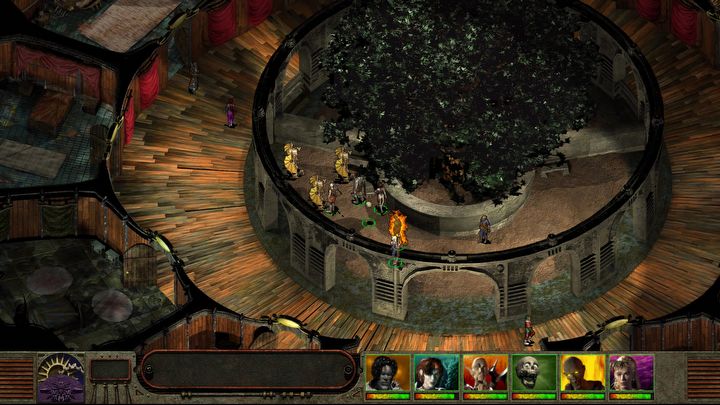
Planescape Torment, Interplay Entertainment, 1999
H.S.: Zasadniczo jesteś odpowiedzialny za ogólny kształt jednej z najbardziej zakręconych i oszałamiających gier RPG.
F.U.: [śmiech] Należy mi się trochę uznania, ale ostatecznie nie tak dużo. Jedyną inną rzeczą, za którą byłem odpowiedzialny w
Planescapie, była walka. W
Tormencie jest bardzo krytykowana. Mówiono, że jest drugorzędna i takie tam. Trzy miesiące przed wydaniem gry znacznie poprawiłem system walki [śmiech], ale byłem w stanie doprowadzić ją tylko do tego punktu. Skupiłem się bardzo na levelowaniu i sprawieniu, by działało dobrze dla wojownika, złodzieja i maga. Wiele z tych niuansów to moje dzieło, ale historia, postacie i znakomita część tej gry – to wszystko Chris. To znaczy, były bardzo drobne rzeczy, które poprawiałem na koniec, ale reszta to Avellone.
H.S.: Ale ty wskazywałeś właściwy kierunek.
F.U.: Jeśli chodzi o historię czy postacie, to wszystko był on. Niedawno odpaliłem na dwie godziny
Tormenta, żeby zobaczyć, jak wtedy działaliśmy, i to było niezwykle interesujące. Chris wykonał fantastyczną robotę, jeśli chodzi o uczynienie gry angażującą i wystarczająco przejrzystą w zakresie zasad, reguł itp. Gra wprowadzała cię bardzo powoli, krok po kroku, ale nabierała tego smaku. Wkręcała totalnie. Sposób, w jaki to zrobiliśmy, był niesamowity. Co do drugiego przykładu – chodzi o
The Outer Worlds.
Dużo rozmawialiśmy o tym, co chcemy zrobić, i bardzo konkretnie weszliśmy w obszar czegoś w rodzaju hard SF. To było jak SF późnych lat 80. i wczesnych 90., bardzo inspirowane
Obcym. Nie w sposobie, w jaki zabijasz kosmitów, ale z punktu widzenia swego rodzaju ciężaru. Napisałem wiele rzeczy o tworzeniu tego dystopicznego świata. Miałem zalążki pomysłów, a Tim i Leonard poszli za tym. I zmienili 99%. Jednak to znów był główny cel nakreślenia „pudełka” na początku. Myślę, że w
The Outer Worlds było dla mnie ważne, abyśmy mogli udać się na wiele planet, by osiągnąć vibe gry science fiction. To było coś, na co naciskałem.
Mam więcej takich historii, ale moja praca w bardzo dużym stopniu polega na obserwacji zespołów i rozumieniu ich kompozycji. Na dopytywaniu się, czy mamy odpowiednią liczbę osób. Kierowanie tak dużymi zespołami jest teraz bardzo trudne. Dyrektorzy gry zarządzają setką osób. Kiedy zaczynają pracę, znają może 50 spośród nich. Więc mogę wiedzieć więcej o załodze niż reżyser. Wiele z tych zadań polega na kierowaniu zespołami w celu dobrania właściwych ludzi. Rzeczami, na których skupiłem się ostatnio trochę bardziej, były sztuka i oświetlenie. Byliśmy tak skupieni na opowieściach, że zapomnieliśmy o tym, jak się prezentują na zewnątrz. Dobry odbiór naszych gier postrzegam jako jeden z moich obowiązków. Tak samo chcę, aby wyglądały całkiem nieźle. To są przykłady wpływu.
H.S.: Jak trudno zarządza się tymi wszystkimi zwariowanymi, charyzmatycznymi artystami, pisarzami, twórcami?
F.U.: Wiesz, to są ludzie, prawda? Chcesz mieć w składzie bardzo inteligentnych, kreatywnych ludzi, którzy wierzą w to, co robią. Czasami ciężko się z nimi pracuje, ale tak powinno być. Taki jest układ. Zespoły tych ludzi muszą robią swoje w ramach szerszego kontekstu i wytycznych, które przyjmujemy. Praca z bardzo asertywnymi ludźmi może być frustrująca, ale takie rzeczy sprawiają, że gry są dobre. Zasadniczo mogę budzić się codziennie i czuć frustrację, ale taka jest praca. Mogę żalić się na to znajomym tylko po to, żeby to z siebie wyrzucić, ale ostatecznie nie jest to coś, co bym chciał kiedykolwiek zmienić. Taką umowę społeczną musieliśmy zawrzeć na poziomie studia z zespołami i podzespołami.
Wróćmy do przykładu
Tormenta. Były rzeczy, które chciałem, żeby się tam znalazły. Silnik
Baldur’s Gate, więcej skupienia na postaci, wizyta w trzech planach i w Sigil. Sprawdzałem miesiąc temu i w Sigil nie mieli nic. I powodów tego może być naprawdę wiele. I oni są o tym bardzo mocno przekonani. Powiedziałem: „OK, porozmawiajmy o tym”. Tak robię za każdym razem. Rozmawiamy o tym, ale trzeba pamiętać, że nie można zmienić podstawowych założeń naszego układu. Dajemy niesamowitą swobodę w ramach wspomnianego „pudełka”, ale trzeba pamiętać o tym „pudełku”. Jeśli chcesz zmienić to „pudełko”, najpierw trzeba o tym porozmawiać. Tutaj występuje najwięcej tarć między zespołami lub ich częściami. Albo wytyczne nie są jasne, co powoduje frustrację, albo wytyczne są jasne, ale ludzie odeszli od nich bez konsultacji. Tak naprawdę wygląda zarządzanie tymi dużymi zespołami.
Wytycznych musi być niewiele i muszą być jasne. Zawsze sprawdzasz grę pod kątem tych zasad. Częścią ludzkiej natury jest iść naprzód i zapominać, więc moim zadaniem jest również przypominać, że „hej, to jest to, co wszyscy ustaliliśmy i chcieliśmy zrobić”. Patrzę na grę dzisiaj i gdy porównam ją z sześcioma założeniami – trzy są idealne, dwa są w miarę OK, a z ostatnim jesteśmy zupełnie gdzie indziej, więc o co chodzi? Brzmi to bardzo prosto, ale nie możesz mieć skomplikowanego systemu, jeśli chcesz zarządzać dużymi zespołami.
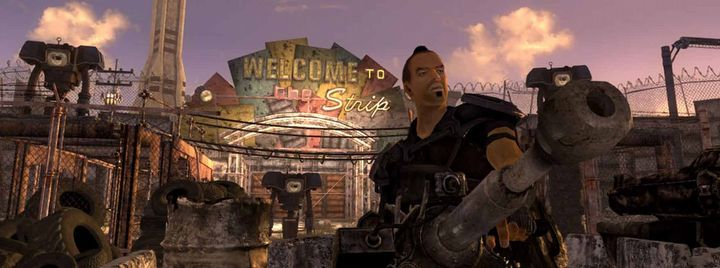
Fallout: New Vegas, Bethesda Softworks, 2010
H.S.: Czy musiałeś podejmować trudne decyzje? Czy były jakieś niepowodzenia, ciężkie czasy, które zmieniły Cię w kontekście zarządzania ludźmi lub projektowania? Czasami miałeś pod górkę.
F.U.: Wrócę do
Fallouta 1. Pod koniec gry chciałem, aby gracz został nagrodzony za wykonanie pewnych rzeczy. Stworzyłem coś, co nazwaliśmy „karabinem turboplazmowym”, czyli karabin plazmowy, którego użycie wymagało jednego punktu akcji mniej. Problem polegał na tym, że ilość obrażeń, które można było zadać na punkt akcji, była daleko poza skalą. To sprawiło, że ta część gry okazała się zbyt łatwa i było za późno, żebyśmy mogli sobie to uświadomić. Więc osobiście zepsułem balans
Fallouta pod koniec gry. Zawsze mi to przypomina, że małe zmiany mogą mieć duże efekty. Z drugiej strony innym przykładem z
Fallouta jest to, że zatrzymałem proces publikacji pod koniec, żeby zmienić algorytm do targowania się. Chodziło o wpływ umiejętności handlu na ceny. To była moja odpowiedzialność, ponieważ robiłem całą matematykę. Ekonomia pod koniec gry byłaby katastrofą! Gracze pewnie by to uwielbiali, ponieważ wpompowanie wszystkich punktów do barteru dawałoby prawie stuprocentowe zniżki. Wszystko byłoby niemal za darmo. Zatrzymaliśmy więc proces i spłaszczyliśmy krzywą wpływu umiejętności na ceny. To była słuszna decyzja, dzięki której ekonomia lepiej funkcjonowała do końca gry. To była dobra lekcja, ucząca, że można na chwilę zatrzymać grę, by naprawić coś, co może wydawać się drobne, ale niekoniecznie takie jest.
Wiele się nauczyłem między
Baldur’s Gate a
Falloutem 2, które wydaliśmy w krótkim odstępie czasu. Ten drugi tytuł był bardzo zabugowany. O wiele bardziej, niż myśleliśmy. To była lekcja uzyskiwania dobrych informacji z kontroli jakości. Pomogła w późniejszym zadawaniu pytań typu: czy mamy wystarczającą liczbę testerów? Czy testują to, co powinni? Do tego pięć, dziesięć, piętnaście innych pytań. Ten temat przewijał się przez wiele naszych gier. Ludzie żartobliwie nazywają nas „Bugsidianem”. Przez ostatnie 10–12 lat ciężko pracowaliśmy, aby dostarczać gry pozbawione błędów. Ale rozumiem to – mieliśmy taką reputację, więc każdy błąd w naszej grze ma większa wagę. Nie chcę czuć się jak ofiara czy coś, ale czasami mam wrażenie, że jesteśmy oceniani trochę surowiej niezależnie od tego, czy w naszych grach faktycznie są błędy, czy nie, ale nasze gry testujemy bardzo mocno, mamy świetnych lead testerów – i to jest coś, czego musiałem się nauczyć w trakcie mojej kariery. To zabawne, bo sam zaczynałem jako tester.
Na razie jestem coraz bardziej skoncentrowany na zrozumieniu tego, co dzieje się z naszą listą błędów i jak nią zarządzamy. Ta lekcja ciągle trwa. To bardzo ważne na moim poziomie. Wiedzieć, jak często powinienem przeglądać dane na listach błędów. Dzięki temu bardzo szybko można się dowiedzieć, czy gra jest gotowa do premiery.
Ostatnia lekcja dotyczyła
South Parku. Pracowaliśmy z Mattem Stone’em i Treyem Parkerem. Mieli pewną wizję systemu walki. Dzieciaki grają w grę RPG w świecie
South Parku. W wyobraźni Matta i Treya powinny one po prostu bić się kijami bez zbyt wielu wymyślnych umiejętności. Przez długi czas postępowaliśmy zgodnie z tą zasadą i walka nigdy nie wydawała się tak przyjemna, jak mogłaby być. Pewnego dnia wziąłem więc zespół od systemu walki. Matt i Trey trzymali się swojego pomysłu, więc powiedziałem mojemu zespołowi, że nie będziemy tego robić. Stworzymy umiejętności, sprawimy, że będzie to szalone i zabawne, a potem będziemy nad tym pracować przez kilka miesięcy. Następnie przedstawiłem efekty Mattowi i Treyowi oraz wyjaśniłem: „Nie zrobiliśmy tego, co chcieliście. Tutaj macie powód. Pograjcie przez godzinę, potem wrócę i powiedziecie mi, co myślicie”. Gdy wróciłem, powiedzieli, że to była dobra decyzja. Bawili się świetnie, poziom trudności był odpowiedni. Zdolności były spełnieniem dziecięcych fantazji. Traktuję to jako lekcję, że trzeba iść w swoim kierunku, nawet jeśli każą ci tego nie robić. Musisz spróbować. W przypadku
Kijka wiedziałem, tak samo jak zespół, że walka musi wyglądać w inny sposób. Musieliśmy wykorzystać tę szansę.
H.S.: Więc czasami jesteś darling-killerem.
F.U.: Tak.
H.S.: A więc jeśli chodzi o trudne decyzje: jak trudne było przetrwanie dwóch trudnych epok – upadku Interplaya i czasu, kiedy Obsidian omal się nie zamknął? Co zmieniło się w Tobie jako twórcy i menedżerze – lub w grach, które stworzyłeś? Przy okazji, Pillarsy są niesamowite!
F.U.: [śmiech] Dziękuję. Więc czego się dowiedziałem...? Mam obawy jak każdy, ale jednocześnie nie mam innych obaw. Może po prostu jestem optymistą? Po prostu wierzę, że sobie poradzimy. Oczywiście zdarzało mi się siedzieć w środku nocy, spoconemu i zmęczonemu, myśląc „zapomnij, rano idę i pakuję to wszystko”. Ale w końcu zawsze staram się myśleć, że zrobimy to świetnie i osiągniemy cel.
Patrząc na Interplay – decyzja o odejściu była świadoma, a podjąłem ją, ponieważ nie sądziłem, że możemy już odnosić sukcesy. Zarabialiśmy dla firmy większość pieniędzy, ale czułem, że dostajemy najmniej wsparcia. To była walka. Podzielę się jednym przykładem. Ludzie pracowali na dwuletnich komputerach. W dzisiejszej pracy wszyscy możemy pracować na dwuletnich komputerach i to jest w porządku. W 2003 roku taki komputer dla twórcy gier był przekleństwem. Poszedłem i dostałem zgodę na 10 nowych komputerów. Myślałem, że zostały kupione. Tak się jednak nie stało i gdy dowiedziałem się, że zakup anulowano, wróciłem i dostałem akceptację jeszcze raz, ale została odrzucona ponownie. Zdecydowano więc, że dyrektor ds. technologii w Interplayu będzie musiał zatwierdzić komputery. Chciał je przejrzeć i wiedzieć, co się w komputerach znajduje.
Prowadząc studio deweloperskie w tamtych czasach, dokładnie znałeś każdą część każdego komputera. Kiedy zakładaliśmy Obsidian, składaliśmy nawet komputery, ja sam potrafię zbudować PC. Ale wtedy w Interplayu pojawiła się frustracja wynikająca z braku zaufania i braku środków na zakup dziesięciu komputerów. Dla zespołu sześćdziesięciu osób. Mówię o tym w ten sposób, bo to ułatwiło odejście. To prawie tak, jakby mnie wykopali. Czasami ludzie mówią, że odejście z Interplaya wymagało wiele odwagi. Pewnie, że tak – moja żona była w ciąży, a kilka lat wcześniej kupiliśmy nowy dom. Wiele rzeczy się zmieniało, więc wymagało to odwagi, ale też ułatwiło mi zdobycie się na tę odwagę.
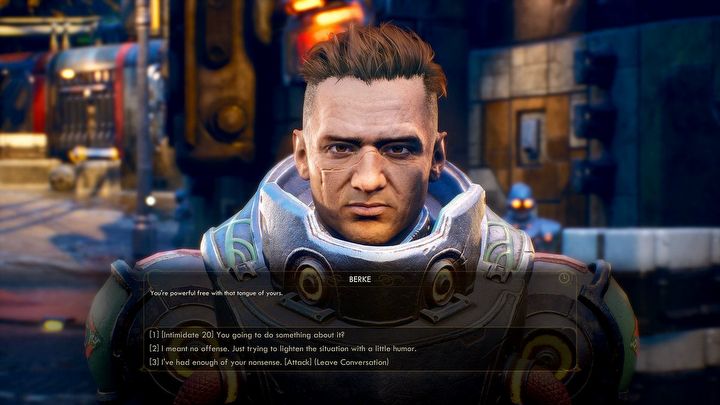
The Outer Worlds, Private Division, 2020
Co do Obsidianu. Jasne, w swoim czasie straciliśmy kilka projektów. Kiedy Microsoft anulował
Stormlands, było to bardzo trudne, ponieważ mieliśmy pracować nad tytułem startowym dla Xboksa. To było jak Święty Graal gier. Własne IP na start nowej generacji... i zostało anulowane. Po prostu nie mieliśmy wtedy dużego wsparcia i byliśmy zmuszeni zwolnić wiele osób. Zwalnialiśmy ludzi, którzy byli z nami przez długi czas. Do dziś tego żałuję. Musieliśmy podejmować decyzje bardzo szybko. To był ciężki czas. Ale przebrnęliśmy. Muszę podziękować Joshowi Sawyerowi i Adamowi Brennecke za przekonanie mnie do uruchomienia własnej kampanii na Kickstarterze. Zupełnie nie wiedziałem, o co w tym chodzi, ale oni tak. I to był wielki sukces.
Nie pamiętam, kiedy to spotkanie miało miejsce, ale patrzyliśmy rok do przodu i zaczynaliśmy się martwić, jak projektować duże gry. Musieliśmy iść i załatwić od wydawcy 50, 60, 70 milionów dolarów. Trudno nakłonić kogoś, by dał ci 50 milionów dolarów. [śmiech] Więc zapytałem: „Co zrobimy? Idziemy na całość? Wyłożymy wszystkie karty na stół czy raczej zagramy zachowawczo?”. To nie mogło być nic pomiędzy. Takie podejście oznaczałoby, że nie tylko będziemy utykać całą drogę, ale też, że miejsce, do którego w końcu dojdziemy, będzie do bani. Wszyscy zgodziliśmy się, że trzeba iść na całość. Bardzo potrzebowałem tej decyzji. Wszyscy znaleźliśmy się po tej samej stronie, myśląc „serio, zrobimy to”, zamiast „jak możemy to szybko zakończyć?”.
H.S.: Brzmi jak wiele trudnych wyborów. [Feargus kiwa głową] Ale mimo wszystko, kiedy patrzę na Obsidian, dochodzę do wniosku, że to zadziałało.
F.U.: Dokładnie.
H.S.: Dlatego w kontraście do ostatnich minut muszę zapytać: jaki był twój największy sukces?
F.U.: Jeden największy triumf? Przetrwaliśmy. Tyle. Przetrwaliśmy. Zostaliśmy przejęci, więc nie jesteśmy już niezależni, ale ogólnie – nie ma wielu niezależnych deweloperów, którzy przetrwali tak długo. W przyszłym roku będziemy obchodzić 20. rocznicę powstania Obsidianu. Inną rzeczą, z której jesteśmy bardzo zadowoleni, jest to, że przeglądając wszystkie nasze gry, jestem z nich dumny. Tak naprawdę. Czy niektóre z nich są lepsze od innych? Pewnie, że tak. Ale jestem dumny z nich wszystkich, tak jak zespoły, które je stworzyły, były z nich dumne. Jeśli umożliwiłem zespołom poczucie dumy z tego, co osiągnęły, to jest to mój osobisty sukces. Czerpię przyjemność z patrzenia na ich dumę i szczęście z tego, co stworzyli. I oczywiście obserwowanie, jak ludzie reagują pozytywnie i cieszą się naszymi grami. Czy nawet pojedynczymi aspektami naszych gier.
Jeśli cofnę się w czasie, zaczynając od
Fallouta lub wcześniejszych gier, nad którymi pracowałem – jestem dumny z
Rock On Racing na Segę Genesis. Musiałem nauczyć się śpiewać piosenkę. Nigdy wcześniej nie licencjonowałem piosenki, wszystko rozgryzłem sam. Później, przechodząc przez te wszystkie lata Interplaya, mieliśmy rewelacyjne stosunki z BioWare i bardzo ciężko na nie pracowałem. I to dało światu
Baldur’s Gate i
Baldur’s Gate 2. Moje wsparcie zespołu od pierwszego
Fallouta. Podwoiłem liczebność zespołu, by
Fallout mógł stać się tym, czym jest. To znaczy, to tylko zarządzanie.
Fallout nie jest moim dzieckiem; po prostu mu pomogłem. Mogę wymienić wiele takich sukcesów. Wrócę jednak do tego, że triumf Obsidianu polega na tym, że przetrwaliśmy i nadal tworzymy gry, które kochamy.
H.S.: Ostatnie pytanie – to niebezpieczne. Muszę je zadać! Czy jest jakaś szansa na pojawienie się tego hipotetycznego nowego Fallouta Obsidianu?
F.U.: W tej chwili nad tym nie pracujemy, mamy dość dużo na głowie przez
Avowed,
Grounded i
The Outer Worlds 2. Nie wiem, kiedy zaczniemy rozmawiać o nowych grach, może pod koniec 2023. Musimy tylko zobaczyć, co się dzieje. Lepiej nie mogę tego opisać. Nie ma nic w planach, nic na papierze. Ale będę się trzymał tego, co powiedziałem. Chciałbym zrobić kolejnego
Fallouta, zanim przejdę na emeryturę. Nie wiem, kiedy to będzie, nie mam określonej daty przejścia na emeryturę. To zabawne, można powiedzieć, że mam już 52 lata – lub dopiero 52. Jedno z dwojga – zależy od dnia. Mam nadzieję, że tak się stanie, ale musimy poczekać i zobaczyć.
Rozmiłowany w szopach i thrash-metalu facet skazany na klawiaturę. Pisania artykułów uczył się pracując dla portalu Dzika Banda. Jego teksty publikowano na kawerna.pl, film.onet.pl, zwierciadlo.pl oraz w polskim Playboyu. W 2017 roku dołączył do GOL jako autor tekstów o grach i filmach. Obecnie jest szefem działu filmowego i portalu Filmomaniak.pl. Żyje "kinem środka" i mięsistą rozrywką, ale nie pogardzi ani eksperymentami, ani "Szybkimi i wściekłymi". W grach szuka dobrej historii. W miłości do Baldur's Gate 2 został wychowany, ale na widok Unreal Tournament, Dooma, czy dobrych wyścigów budzi się w nim dziecko. Opublikował opowiadania w miesięczniku Science Fiction Fantasy i Horror oraz pierwszym tomie Antologii Wolsung. Kiedyś w końcu napisze książkę, naprawdę! Od 2012 roku gra i tworzy larpy, zarówno w ramach Białostockiego Klubu Larpowego Żywia jak i komercyjne przedsięwzięcia w stylu Witcher School. Coś tam ćwiczył, ale dawno i nieprawda. Przerzucił się na ciastka.


























